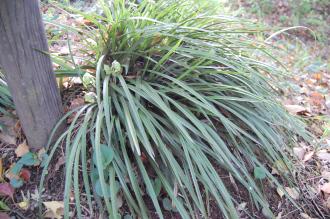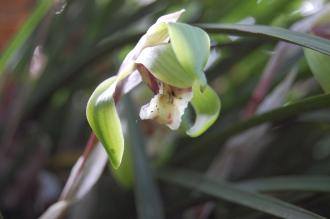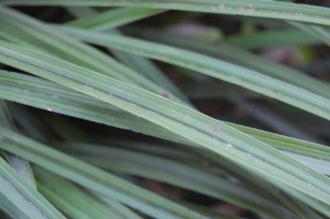
Cymbidium goeringii (18/04/2015, Imperial Palace East Garden, Tokyo, Japan)
Position: Dappled shade
Flowering period: Spring
Soil: Moist, well drained
Eventual Height: 25cm
Eventual Spread: 40cm
Hardiness: 7b, 8a, 8b, 9a, 9b, 10a
Family: Orchidaceae
Cymbidium goeringii is an evergreen herbaceous perennial with a clump forming habit. Its mid green leaves are strap shaped with entire margins, up to 40cm long and 1cm across. Its fragrant green flower is up to 5cm across and appear terminally on a flower stalk which is up to 25cm long. Its fruit is a vertically growing seed pod. Its roots are thick and fleshy and attached to pseudobulbs.

Cymbidium goeringii Flower (18/04/2015, Imperial Palace East Garden, Tokyo, Japan)
Cymbidium goeringii, commonly known as Noble Orchid or Shunran, is native to the Himalayan regions, south west China, Taiwan, Japan and south Korea. In its native habitat it grows in moist woodlands.
The etymological root of the binomial name Cymbidium is derived from the Greek kumbe meaning boat ‘shaped’. Goeringii is named after Philip Friedrich Wilhelm Goering (1809 – 1879), a German botanist.

Cymbidium goeringii Leaf (18/04/2015, Imperial Palace East Garden, Tokyo, Japan)
The landscape architect may find Cymbidium goeringii useful as an unusual addition to a woodland understory planting scheme.
Ecologically, Cymbidium goeringii is of little value to UK wildlife.
Cymbidium goeringii prefers moist, humus rich, well-drained soils. It tolerates most pH of soil.
Cymbidium goeringii requires little maintenance.

Landscape Architecture

